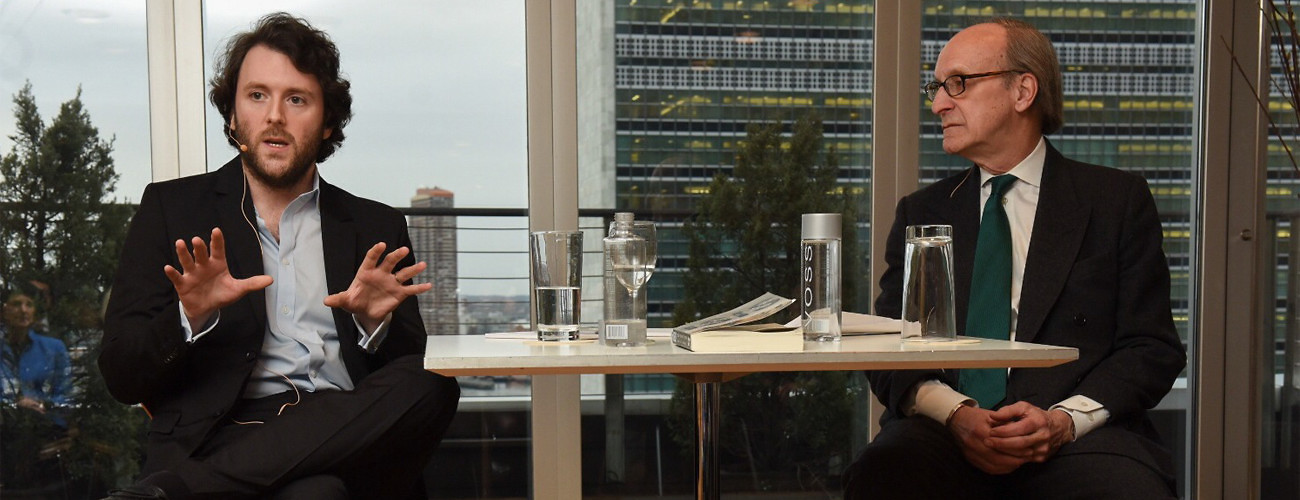When 16-year-old Abdelaziz from Bahrain joined the group known today as the Islamic State, it was because he felt “imprisoned” and “tied up” in his life at home and longed to be free, living the honorable life of his “brothers” fighting in Syria. After deceiving his parents, Abdelaziz managed to get into Syria and joined what was then the Islamic State of Iraq and al-Sham (ISIS), rising in its ranks, signing on to its agenda of savagery, and becoming a security official overseeing three towns on the Syrian-Iraqi border. A few months later, he was shot dead by a Syrian regime sniper.
Stories like that of Abdelaziz abound in the pages of ISIS: Inside the Army of Terror, the new book on the terrorist group by Michael Weiss and Hassan Hassan. Mr. Weiss, an American journalist who spent several months reporting from Syria after the revolution, explained at an IPI Distinguished Author Series event on April 8th how the group has managed to enthrall thousands of Muslim youth like Abdelaziz and how it came to exist in the first place.
“When you look at ISIS today, it’s not just a terrorist organization; it is also a mafia, and fundamentally a form of Sunni-power political projection,” he said. The group’s sectarian streak, Mr. Weiss said, is in part the result of the damage caused by Bashar al-Assad’s crackdown in Syria, as well as the actions the US took in Iraq after the 2003 invasion.
“Sunnis allowed al-Qaeda in Iraq to reform, to reconstitute themselves essentially out of a fundamental political grievance with the nature and the direction that Baghdad was heading in,” he said, referring to the Iraqi government under the leadership of former prime minister Nouri al-Maliki, a Shia. “And the US was an accomplice, whether by accident or design, in the creation of these grievances,” by implicitly supporting Maliki and his policies, he continued.
ISIS today is also an effective, organized army, Mr. Weiss said. Its mafia- and army-like structure can be traced back to its leadership, which Mr. Weiss said is primarily made up of former members of Saddam Hussein’s Ba’athist regime, who were cashiered by the occupying Americans and left to reassemble as an insurgent force.
“This is a fundamentally Iraqized army…. They know exactly where all the smuggling rings are,” Mr. Weiss said. “How did [they] manage to conquer Mosul? They had help on the ground.” Sunnis, he said, opened their doors to an organization they had earlier expelled only because there was no other alternative. In their mind, he said, Baghdad under Maliki was a worse oppressor.
But to understand why ISIS has put so much emphasis on being a Sunni political power radically opposed to Shias—whom it considers apostates—Mr. Weiss said you need to go back to its origins, to a man called Abu Musab al-Zarqawi. A native of Jordan, Zarqawi spent years in Afghanistan training jihadis, later returning to the Levant with the intent to bring down the region’s authoritarian regimes and to get rid of the Shias, Mr. Weiss explained.
“His goal, from the very beginning, was to foment a sectarian civil war by going after the Shias… such that this would prompt a retaliatory strike by the Shias,” he said. This was a markedly different strategy from that of Osama Bin Laden and al-Qaeda, which was the dominant group at the time and whose main target was the United States, Mr. Weiss said. But with time, the Zarqawi “franchise,” which initially consisted primarily of foreign fighters, came to be owned by Iraqis themselves and eventually eclipsed global al-Qaeda in terms of finances and prestige, Mr. Weiss continued.
As to ISIS’ gains in Syria, Mr. Weiss said they stem out of the conflict there and the actions of the regime. “The reason they have such a perch in Syria is because the Assad regime allowed them to gain that perch,” he said. It is Assad and his policies, Mr. Weiss continued, that have turned Syria into what it is today—barely a country anymore.
Understanding all this—how the group came about and what sustains it—is crucial in devising a strategy to counter it, Mr. Weiss said. But counterterrorism alone won’t do it, he added.
“Looking at this organization strictly through the prism of counterterrorism is a fool’s errand,” he said. “You have to understand who the players are at the top, you have to understand what is motivating recruitment.”
While the group has suffered some setbacks since the beginning of the US-led air campaign, the messages Washington keeps on sending are not helping the effort, Mr. Weiss noted. He said the recent nuclear framework between Iran, the US, and five other world powers is perhaps a good deal on the nuclear details, but not so much when it comes to its message.
“The indications and the messaging from the White House are that this is about something bigger, that this is about rapprochement with the Islamic Republic,” he said. This damages the US reputation on the ground, he said, where people believe President Obama prefers the Shias to the Sunnis, thus further exacerbating Sunni political grievances.
“This is like a bullet leaving the chamber of a gun and watching it travel in slow motion,” he said.
The conversation was moderated by IPI Senior Adviser for External Relations Warren Hoge.








